Pete Sutton's Blog, page 42
September 2, 2014
Acceptance review (and Annihilation & Authority)
Acceptance by Jeff VanderMeer
As this is the third book in the series if you’ve not read the previous do you must do so. At some point I will be re-reading all three books together and providing a Southern Reach review.
A reminder of my reviews of the first two:
Annihilation
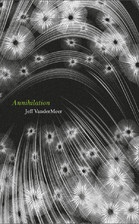
Area X has been contained behind the border for 30 years.
So starts the first book in a new trilogy from Jeff VanderMeer. The Southern Reach has sent 11 expeditions into Area X. Many of them have failed to come back, or have come back changed Our narrator is one of 4 in the 12th expedition, she is a biologist and joins a psychologist, surveyor and anthropologist. This is her story. This is the story of the 12th expedition. This is the story of, well let’s not reveal too much here shall we?
This is an example of isolation fiction with a hearty dollop of paranoia on top of the fear and mystery. VanderMeer weaves a web of wicked weirdness that conceals to reveal. We have so many questions that are not answered and may never be but this is because the mystery is, well mysterious. Our narrator is no more clued up than we are and, crucially, compromised. Can we trust her? Can we trust anyone on the team? Can we trust The Southern Reach? Why aren’t expeditions allowed to take cameras, or telecoms, or most other modern technology but are allowed to take guns? What is the true purpose of the expeditions? What is Area X? What is the significance of the Lighthouse? Do we really want to know what the strange noises in the night are? Why did the Biologist join the expedition?
There are several VanderMeerisms (yes that is a word) that will appeal to fans of his earlier work (no spoilers but I bet you can guess what I mean) but this is a slightly different tale to those he has told before. He describes a real and lush landscape in almost cinematic terms. He also manages to make it feel uncanny with a few deft touches and therefore even though the palette is light he achieves a darker tale. I was in the story from the first paragraph, rushing gladly through the book simultaneously desperate to know what was going to happen and deeply dreading knowing in case that knowledge were to change me irrevocably.
It will be compared to Roadside Picnic by the Strugatskys no doubt and possibly Dark Matter By Michelle Paver and there are brief elements of familiarity here if you are well read in the Weird. However VanderMeer has carved a compelling and fresh tale that may owe a passing nod to Lovecraft but only in the same way that a modern car would owe a nod to a Model T. If any complaint were to be levelled at this it would be that we are forced to wait some months before the second in the trilogy is released. Will we get our answers in that tome? Do we want answers? Perhaps it’s safer not to know.
Overall – I can only describe this as VanderMeerian (yes that is also a word) in its brilliance. If you’re a fan of VanderMeer go, buy, read! If you’re not a fan of VanderMeer why the hell not?
Authority
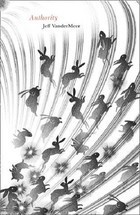 In the aftermath of the 12th expedition we follow "Control" the nom de guerre of the new director of the Southern Reach. Some of the questions in the first book are answered but many mysteries remain, are deepened in fact. This is different in tone and style and yet the two books are so inextricably linked that whilst reading this volume I had to several times resist the urge to go back and re-read Annihilation. When I have completed all three books I can imagine re-reading all three as a "whole".
In the aftermath of the 12th expedition we follow "Control" the nom de guerre of the new director of the Southern Reach. Some of the questions in the first book are answered but many mysteries remain, are deepened in fact. This is different in tone and style and yet the two books are so inextricably linked that whilst reading this volume I had to several times resist the urge to go back and re-read Annihilation. When I have completed all three books I can imagine re-reading all three as a "whole".
I won't go into the plot - that's a doorway you'll have to cross by yourself. This is less dream-like (although relies, in part, on dreams to build the experience) and less pared down than Annihilation but feels like a layering on of information, themes, character, plot, sense of place, and, to use a term from the book (and the wine world), terroir. It is a deeply sensuous experience that I gorged myself upon. Another reason to re-read once all three have been ravenously consumed will be to take it slower and appreciate the craft. For to be sure there is much craft in these books to admire.
Comparisons are useless, this is idiosyncratic and it is obvious that much thought and care has been put into this as a book, as the second in a trilogy, as a bridge, as a complex exploration of transformation and immersion. Everything becomes significant, it is like being indoctrinated by a conspiracy theorist. It is both a reflection and an intermingling with the first book. Themes are re-explored, re-examined, deepened.
Throughout, as per the word Annihilation in the first book, I was considering – what is authority?, what is control? There is a Russian doll feel to it. Turn over a phrase and find a concept which when considered is but a layer of a greater theme which in turn is reflected in character development, or description, or dialogue. Throughout is a key uncertainty, which in itself is another theme – surface detail is a concealment, an obfuscation of the truth, or is it?
Adding to this is the very form of the story. Presented in a paranoid spy thriller atmosphere as organisational politics meets intelligence meets counter-intelligence. Power struggles, suspicions, revelations, tug-of-war manoeuvres and the use of hypnosis (itself a recurrence of something explored in Annihilation) conspire to keep you immersed and engaged.
VanderMeer has parcelled out information, seemingly generously (in comparison to Annihilation) and yet the mystery remains and is, if anything, deeper following this book. At the end of Annihilation I wanted answers and yet wasn’t sure I’d like what the answers were and was simultaneously eager and afraid of reading the next book. At the end of Authority I wanted the next book to be there to hand, to tear straight into, the level of suspense and anticipation has been built to fever pitch.
Overall – This is a book and a series that deserves all the praise. I expect prizes in the future.
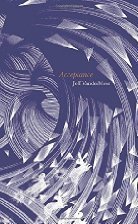 Acceptance entwines several narratives from both the past and the present, as we understand it from the previous books. It is worth noting at the outset that although there are revelations and answers there is also still much mystery and those seeking an explanation for all that has gone before may be somewhat disappointed. But then if you’ve got this far you’re not really seeking an explanation are you? You’re revelling in the experience and frolicking with the ideas. Surely. Acceptance is non-linear and jumps chapter by chapter between the Lighthouse Keeper (yes that lighthouse keeper! Control, Ghost Bird and the Psychologist with one of those POVs being in second person, difficult to bring off but brilliant when it works (and VanderMeer is never less than brilliant). It is, again, a re-examination of the same events of the previous two books with a deepening and broadening of our perception of what happened and what is happening.
Acceptance entwines several narratives from both the past and the present, as we understand it from the previous books. It is worth noting at the outset that although there are revelations and answers there is also still much mystery and those seeking an explanation for all that has gone before may be somewhat disappointed. But then if you’ve got this far you’re not really seeking an explanation are you? You’re revelling in the experience and frolicking with the ideas. Surely. Acceptance is non-linear and jumps chapter by chapter between the Lighthouse Keeper (yes that lighthouse keeper! Control, Ghost Bird and the Psychologist with one of those POVs being in second person, difficult to bring off but brilliant when it works (and VanderMeer is never less than brilliant). It is, again, a re-examination of the same events of the previous two books with a deepening and broadening of our perception of what happened and what is happening.
There is much in here that will take some pondering, there is a lingering unease and a sense of wonder and awe. Being able to read all three in the year of publication, across the year, devoured as soon as they arrived and waiting with bated breath for the next, has been an experience. Sharing that experience with a book club has only made it better. On this side of reading the series I am satisfied and yet want to explore more. Content with the experience and the world of the books and yet want to dive back in. This is a towering achievement and one that deserves a wide readership. I won’t cover the plot (why change now?) but suffice to say that as we follow the various narrators we get a variety of perspectives on Area X. Having heard the author talk about the books, and gained a little insight from various interviews I am sure that these books will spawn a “guide to Area X” and the next time I read them I’ll be keeping notes.
To dip back into wine (since terroir is of importance to these books) Acceptance is the long finish revealing the complexity of the robust first notes and the palate pleasing middle notes leaving you thirsty for another draught of the same.
Overall – If you’ve read Annihilation and authority there is no need for me to tell you to read this book. If you’ve not read them then I heartily recommend the entire series and this entirely satisfying conclusion.
As this is the third book in the series if you’ve not read the previous do you must do so. At some point I will be re-reading all three books together and providing a Southern Reach review.
A reminder of my reviews of the first two:
Annihilation

Area X has been contained behind the border for 30 years.
So starts the first book in a new trilogy from Jeff VanderMeer. The Southern Reach has sent 11 expeditions into Area X. Many of them have failed to come back, or have come back changed Our narrator is one of 4 in the 12th expedition, she is a biologist and joins a psychologist, surveyor and anthropologist. This is her story. This is the story of the 12th expedition. This is the story of, well let’s not reveal too much here shall we?
This is an example of isolation fiction with a hearty dollop of paranoia on top of the fear and mystery. VanderMeer weaves a web of wicked weirdness that conceals to reveal. We have so many questions that are not answered and may never be but this is because the mystery is, well mysterious. Our narrator is no more clued up than we are and, crucially, compromised. Can we trust her? Can we trust anyone on the team? Can we trust The Southern Reach? Why aren’t expeditions allowed to take cameras, or telecoms, or most other modern technology but are allowed to take guns? What is the true purpose of the expeditions? What is Area X? What is the significance of the Lighthouse? Do we really want to know what the strange noises in the night are? Why did the Biologist join the expedition?
There are several VanderMeerisms (yes that is a word) that will appeal to fans of his earlier work (no spoilers but I bet you can guess what I mean) but this is a slightly different tale to those he has told before. He describes a real and lush landscape in almost cinematic terms. He also manages to make it feel uncanny with a few deft touches and therefore even though the palette is light he achieves a darker tale. I was in the story from the first paragraph, rushing gladly through the book simultaneously desperate to know what was going to happen and deeply dreading knowing in case that knowledge were to change me irrevocably.
It will be compared to Roadside Picnic by the Strugatskys no doubt and possibly Dark Matter By Michelle Paver and there are brief elements of familiarity here if you are well read in the Weird. However VanderMeer has carved a compelling and fresh tale that may owe a passing nod to Lovecraft but only in the same way that a modern car would owe a nod to a Model T. If any complaint were to be levelled at this it would be that we are forced to wait some months before the second in the trilogy is released. Will we get our answers in that tome? Do we want answers? Perhaps it’s safer not to know.
Overall – I can only describe this as VanderMeerian (yes that is also a word) in its brilliance. If you’re a fan of VanderMeer go, buy, read! If you’re not a fan of VanderMeer why the hell not?
Authority
 In the aftermath of the 12th expedition we follow "Control" the nom de guerre of the new director of the Southern Reach. Some of the questions in the first book are answered but many mysteries remain, are deepened in fact. This is different in tone and style and yet the two books are so inextricably linked that whilst reading this volume I had to several times resist the urge to go back and re-read Annihilation. When I have completed all three books I can imagine re-reading all three as a "whole".
In the aftermath of the 12th expedition we follow "Control" the nom de guerre of the new director of the Southern Reach. Some of the questions in the first book are answered but many mysteries remain, are deepened in fact. This is different in tone and style and yet the two books are so inextricably linked that whilst reading this volume I had to several times resist the urge to go back and re-read Annihilation. When I have completed all three books I can imagine re-reading all three as a "whole". I won't go into the plot - that's a doorway you'll have to cross by yourself. This is less dream-like (although relies, in part, on dreams to build the experience) and less pared down than Annihilation but feels like a layering on of information, themes, character, plot, sense of place, and, to use a term from the book (and the wine world), terroir. It is a deeply sensuous experience that I gorged myself upon. Another reason to re-read once all three have been ravenously consumed will be to take it slower and appreciate the craft. For to be sure there is much craft in these books to admire.
Comparisons are useless, this is idiosyncratic and it is obvious that much thought and care has been put into this as a book, as the second in a trilogy, as a bridge, as a complex exploration of transformation and immersion. Everything becomes significant, it is like being indoctrinated by a conspiracy theorist. It is both a reflection and an intermingling with the first book. Themes are re-explored, re-examined, deepened.
Throughout, as per the word Annihilation in the first book, I was considering – what is authority?, what is control? There is a Russian doll feel to it. Turn over a phrase and find a concept which when considered is but a layer of a greater theme which in turn is reflected in character development, or description, or dialogue. Throughout is a key uncertainty, which in itself is another theme – surface detail is a concealment, an obfuscation of the truth, or is it?
Adding to this is the very form of the story. Presented in a paranoid spy thriller atmosphere as organisational politics meets intelligence meets counter-intelligence. Power struggles, suspicions, revelations, tug-of-war manoeuvres and the use of hypnosis (itself a recurrence of something explored in Annihilation) conspire to keep you immersed and engaged.
VanderMeer has parcelled out information, seemingly generously (in comparison to Annihilation) and yet the mystery remains and is, if anything, deeper following this book. At the end of Annihilation I wanted answers and yet wasn’t sure I’d like what the answers were and was simultaneously eager and afraid of reading the next book. At the end of Authority I wanted the next book to be there to hand, to tear straight into, the level of suspense and anticipation has been built to fever pitch.
Overall – This is a book and a series that deserves all the praise. I expect prizes in the future.
 Acceptance entwines several narratives from both the past and the present, as we understand it from the previous books. It is worth noting at the outset that although there are revelations and answers there is also still much mystery and those seeking an explanation for all that has gone before may be somewhat disappointed. But then if you’ve got this far you’re not really seeking an explanation are you? You’re revelling in the experience and frolicking with the ideas. Surely. Acceptance is non-linear and jumps chapter by chapter between the Lighthouse Keeper (yes that lighthouse keeper! Control, Ghost Bird and the Psychologist with one of those POVs being in second person, difficult to bring off but brilliant when it works (and VanderMeer is never less than brilliant). It is, again, a re-examination of the same events of the previous two books with a deepening and broadening of our perception of what happened and what is happening.
Acceptance entwines several narratives from both the past and the present, as we understand it from the previous books. It is worth noting at the outset that although there are revelations and answers there is also still much mystery and those seeking an explanation for all that has gone before may be somewhat disappointed. But then if you’ve got this far you’re not really seeking an explanation are you? You’re revelling in the experience and frolicking with the ideas. Surely. Acceptance is non-linear and jumps chapter by chapter between the Lighthouse Keeper (yes that lighthouse keeper! Control, Ghost Bird and the Psychologist with one of those POVs being in second person, difficult to bring off but brilliant when it works (and VanderMeer is never less than brilliant). It is, again, a re-examination of the same events of the previous two books with a deepening and broadening of our perception of what happened and what is happening.There is much in here that will take some pondering, there is a lingering unease and a sense of wonder and awe. Being able to read all three in the year of publication, across the year, devoured as soon as they arrived and waiting with bated breath for the next, has been an experience. Sharing that experience with a book club has only made it better. On this side of reading the series I am satisfied and yet want to explore more. Content with the experience and the world of the books and yet want to dive back in. This is a towering achievement and one that deserves a wide readership. I won’t cover the plot (why change now?) but suffice to say that as we follow the various narrators we get a variety of perspectives on Area X. Having heard the author talk about the books, and gained a little insight from various interviews I am sure that these books will spawn a “guide to Area X” and the next time I read them I’ll be keeping notes.
To dip back into wine (since terroir is of importance to these books) Acceptance is the long finish revealing the complexity of the robust first notes and the palate pleasing middle notes leaving you thirsty for another draught of the same.
Overall – If you’ve read Annihilation and authority there is no need for me to tell you to read this book. If you’ve not read them then I heartily recommend the entire series and this entirely satisfying conclusion.
Published on September 02, 2014 06:59
September 1, 2014
Reviews - The Knowledge & Premonitions
The knowledge by Lewis Dartnell
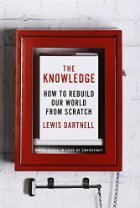
Dartnell sets out to outline the knowledge required to rebuild out modern society after an apocalypse. Full of interesting information it kind of fails at its stated aim, in my opinion, because it assumes that the apocalypse is a “nice” one (i.e. doesn’t destroy the infrastructure too much) and that the folk left behind will have a viable population for industrial society. However if you’re ready to take those two assumptions then Dartnell takes a whirlwind tour of restarting electricity, industrial chemistry, medicine, communications and all the rest of the technologies that make the modern world what it is. Along the way you’ll get a great, but brief, overview of all these things. It is, by necessity, brief and perhaps this is the greatest criticism that can be levelled at the book since anyone can tell you that the devil is in the details. There are a few illustrations but if anything it is a primer for the intelligent survivor to know what knowledge he needs to seek out.
Overall – You’ll need more than this one book to help you restart civilisation, but having this one book will give you a good headstart
Premonitions by Jamie Schultz
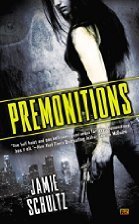
Karyn Ames hallucinates the future, she’s the leader of a small crew who procure antiquities and magical gewgaws using her skills to avoid trouble. However her hallucinations are bad, they can take over her life, so she takes a drug called blind, only really available from one fairly creepy drug dealer who lives in a ruin and is overly fond of rats. When the group are approached by a notorious crime boss who wants them to steal a relic from a cult the crew agree because there is a two million dollar payout for them if they do. Told from a variety of POVs this is a smart, modern supernatural heist novel that is a whole ton of fun. This is the first in a series, with the intro to the second in the back, so could feel a bit unfinished in a lesser writer’s hands, however it has a very satisfying wholeness to the story and yet the world is such that you know you’re not done with the characters.
Schultz will no doubt be compared to Wendig as they both have female protagonists who glimpse the future and both writers have a knack for witty prose and fast moving plots.
Overall – Great start to a series & I’ll definitely be tracking the second book down

Dartnell sets out to outline the knowledge required to rebuild out modern society after an apocalypse. Full of interesting information it kind of fails at its stated aim, in my opinion, because it assumes that the apocalypse is a “nice” one (i.e. doesn’t destroy the infrastructure too much) and that the folk left behind will have a viable population for industrial society. However if you’re ready to take those two assumptions then Dartnell takes a whirlwind tour of restarting electricity, industrial chemistry, medicine, communications and all the rest of the technologies that make the modern world what it is. Along the way you’ll get a great, but brief, overview of all these things. It is, by necessity, brief and perhaps this is the greatest criticism that can be levelled at the book since anyone can tell you that the devil is in the details. There are a few illustrations but if anything it is a primer for the intelligent survivor to know what knowledge he needs to seek out.
Overall – You’ll need more than this one book to help you restart civilisation, but having this one book will give you a good headstart
Premonitions by Jamie Schultz

Karyn Ames hallucinates the future, she’s the leader of a small crew who procure antiquities and magical gewgaws using her skills to avoid trouble. However her hallucinations are bad, they can take over her life, so she takes a drug called blind, only really available from one fairly creepy drug dealer who lives in a ruin and is overly fond of rats. When the group are approached by a notorious crime boss who wants them to steal a relic from a cult the crew agree because there is a two million dollar payout for them if they do. Told from a variety of POVs this is a smart, modern supernatural heist novel that is a whole ton of fun. This is the first in a series, with the intro to the second in the back, so could feel a bit unfinished in a lesser writer’s hands, however it has a very satisfying wholeness to the story and yet the world is such that you know you’re not done with the characters.
Schultz will no doubt be compared to Wendig as they both have female protagonists who glimpse the future and both writers have a knack for witty prose and fast moving plots.
Overall – Great start to a series & I’ll definitely be tracking the second book down
Published on September 01, 2014 06:43
August 29, 2014
Loncon 3, Edinburgh, VanderMeers & FantasyCon
OK a lot of stuff has happened and I've not blogged due to lack of computer access, lack of time and dread lurgy. So now I'm remedying that .. read on for a looong post on what I've been up to
After 9 worlds there was a break for "Real Life" before heading back down to London for Loncon. We had bought day tickets only (more on that later) but went down Friday night so we could nerd out over Shakespeare and go to the globe to see Anthony & Cleopatra

As usual high production values, great acting (even if the leading lady was a stand in with script in hand) and for once no rain. The Globe is great and if you've not been to see Shakespeare there you really should. I recommend standing - close to the stage if you can.
After a very quick visit to Borough Market and being disappointed that our favourite breakfast cafe was closed, we hightailed it across town to the Excel centre.
That's a big building.
It swallowed 10,000 people easily. And yet I still managed to bump into a lot of people I know and even got time to chat to a few of them including a friend I've not seen for several years.
After a brusque sign in, where we witnessed the greeter shout at her helper for trying to give us the free book. Imagine, giving a freebie to those day visitor scum!
We arrived in time to see Jeff VanderMeer (Jeff's a recurring character in this post) moderate a panel that included Pat Cadigan and Robert Jackson Bennet on "Imaginative Resistance" which wandered a little off topic at times but was really interesting, although I would have liked to hear more from Sarita Robinson the psychologist on the panel.

After wandering round the dealers hall and lunch is was my turn to be on a panel Old New Classics: The off-beat and indie comics of yore, after a quick visit to the Green room for a complimentary drink. Sadly Scott Edelman was ill so I ended up moderating. I was slightly bemused as to why we were in a much larger room than the earlier panel I attended.
We then decided to have a wander round the dealers hall again, the art stuff, the fan village and spent a pleasant hour or so chatting with folk from Bristol over a relatively reasonably priced pint of real ale.
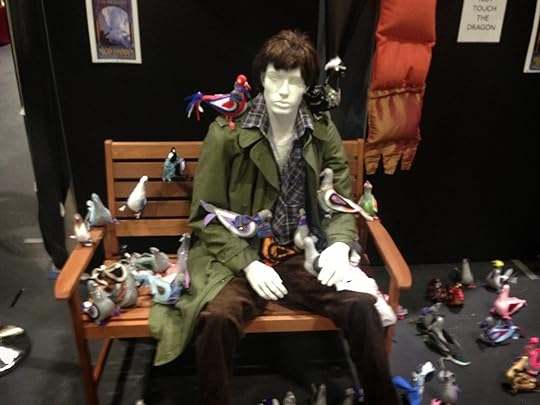
We tried a couple of other panels too including one on awards because it had Anne Perry on it
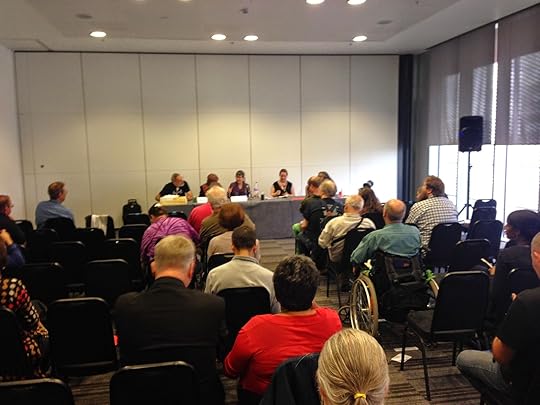
Then it was time to head to the fan village for the Pirate Program where I was set to do a reading. I chose to do Five for Silver (because it has pirates in it) from the collection Thunder and Magpies (more on that below too) but had time for only half of it - didn't get much laughs this time so think the first half set up is definitely required. I love the idea of the Pirate Program - more details here
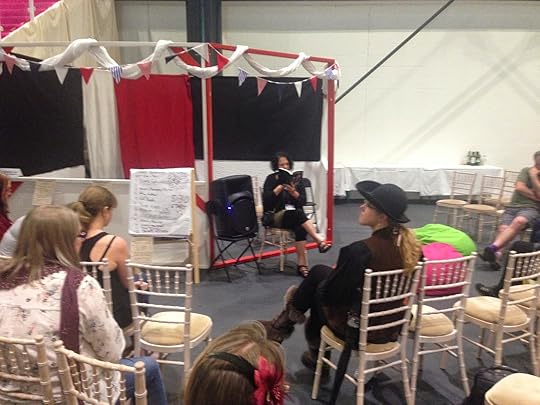
Then we had to scurry off and get a train.
Now I've read the Daily Dot article & Pat Cadigan's riposte (on Facebook) which addresses the ageist nature of the DD article. Having attended both 9 worlds and Loncon (and enjoyed both) I think the DD make a category error that Cadigan ably demolishes in that the difference is not about the age of the attendees it is more a scale and scope thing. However I disagree with Cadigan that if people don't feel welcome they should just "get over it" & I think our experience at sign in & throughout LonCon ("Oh you're only here for one day" said pretty much everyone we met as it said so loud and clear on the badge) was different to 9 Worlds. How about instead of scoffing at the fact people felt more welcome at 9 worlds you wonder why this is so and try to make Worldcon more welcoming?
The next day we flew to Edinburgh

We hit the ground running and chose a random show that had some good reviews and it was pretty much the best thing we saw at the fest - Inheritance Blues. We then went to a brilliant Skeptics on the Fringe talk on knitting and mathematics
 and then to see a very disappointing Richard Herring who's show seemed confused and cobbled together and pretty much the worst thing we saw at the fringe.
and then to see a very disappointing Richard Herring who's show seemed confused and cobbled together and pretty much the worst thing we saw at the fringe.Over the next few days we saw Jeff VanderMeer & Nick Harkaway at the Book Fest (not at the same time) & was very restrained in the Book Festival shop, saw poetry, music, comedy and theatre, Simon Munnery, Mitch Benn, a show based on Quantum physics with Jim Al Khalili and one improvised and based on Quantum Leap, we went to a photography exhibition and a gin tasting tour. As usual Edinburgh was eclectic, hectic and very enjoyable & we'll be back next year as usual.

Back to Bristol in time to attend The Bristol Bad Film Club showing of Masters of the Universe outdoors in a park.

Which was great.
Then Monday was our Small Stories: Big Books event with the VanderMeers. Many thanks to all involved especially Nat & Sian from Small Stories, Cheryl Morgan, Aaron Anthony, Luke Slevin & Pat Hawks-Reed!
 Ann & Jeff were interviewed by Cheryl Morgan
Ann & Jeff were interviewed by Cheryl MorganLuke Slevin created a fantastic piece of art
 We had cake (Thanks to Pat Hawks-Reed!)
We had cake (Thanks to Pat Hawks-Reed!) and a reading by actor Aaron Anthony
and a reading by actor Aaron Anthony And the evening seemed to go down well with all involved, which meant a big sigh of relief from me!
And the evening seemed to go down well with all involved, which meant a big sigh of relief from me!The next day we showed Ann & Jeff around Bristol & Bath, including meeting a bunch of Aussie writers in a pub (obviously) before Jeff's event at Mr B's Emporium
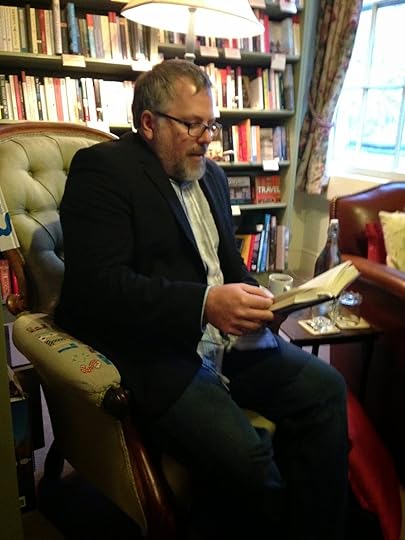 and a fantastic meal at the Firehouse which I'd highly recommend. Then my cold got the better of me for a few days and here we are looking towards future booky events.
and a fantastic meal at the Firehouse which I'd highly recommend. Then my cold got the better of me for a few days and here we are looking towards future booky events.First up is Fantasycon where I'll be doing a reading after Adrian Tchaikovsky and before Emma Newman (so no pressure there then!). Haven't decided what to read as yet. I've put together a collection of my stories in what I'm currently calling Thunder & Magpies which has had good reviews from beta readers and is now out with a publisher for consideration. I may read from that. I am also currently working on an anthology with the North Bristol Writing Group called North by Southwest and potentially could read one of my stories from that. Expect to hear more about both of those and another anthology I'm working on (more details soon) over the next few months.
It's a busy time here - I'm working on some reviews, currently reading an Akashic ARC which will lead to an exciting interview (details soon). As well as working on three (or maybe four) anthologies I'm going to start revising & editing my novel (tentatively called Seven Deadly Swords) for submission hopefully by end of the year. I'm also editing a friend's self-pub book (which is teaching me a lot) and have been approached with another MS. As well as working on editing Far Horizons which is also a great learning experience.
Right, best get on with those reviews ...
Published on August 29, 2014 03:14
August 15, 2014
Meatspace review
Meatspace by Nikesh Shukla
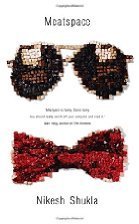
Kitab is an author with one book to his name, greeted lukewarmly by the literati. He’s supposed to be working on a second book but is slowly frittering away his inheritance whilst spending so much time on social media his girlfriend dumps him. When he gets a friend request from someone with the same name as him his life takes an odd turn. This is a funny book that makes you think, a hard trick to pull off. Shukla’s voice shines through the prose and he’s a funny guy. It’s a meditation on identity, identity theft and the Facebook generation. But, you know, in a funny way. There’s an extra level of meaning for someone who hangs around the lit scene in the city and frequents readings. It’s often self-referential and finger on the pulse but what Shukla achieves with the core theme is always engaging and the pages just fly by. Interspersed with the main story are extracts from a blog about Kitab’s brother going to New York which is like a shaggy dog story and just as entertaining, if not more so, as the main story.
Overall – highly enjoyable second novel about a guy writing his second novel. Recommended

Kitab is an author with one book to his name, greeted lukewarmly by the literati. He’s supposed to be working on a second book but is slowly frittering away his inheritance whilst spending so much time on social media his girlfriend dumps him. When he gets a friend request from someone with the same name as him his life takes an odd turn. This is a funny book that makes you think, a hard trick to pull off. Shukla’s voice shines through the prose and he’s a funny guy. It’s a meditation on identity, identity theft and the Facebook generation. But, you know, in a funny way. There’s an extra level of meaning for someone who hangs around the lit scene in the city and frequents readings. It’s often self-referential and finger on the pulse but what Shukla achieves with the core theme is always engaging and the pages just fly by. Interspersed with the main story are extracts from a blog about Kitab’s brother going to New York which is like a shaggy dog story and just as entertaining, if not more so, as the main story.
Overall – highly enjoyable second novel about a guy writing his second novel. Recommended
Published on August 15, 2014 01:43
August 14, 2014
Art of Forgetting - Review
Art of forgetting: Nomad by Joanne Hall 
This is the second part of a duology –
First half review: (The art of forgetting: Rider)
Rhodri is a foundling and has a perfect memory. He clearly remembers his father but knows very little about his early childhood. This is an important plot point, which does raise a few questions, no spoilers but he had a pretty famous father who I just thought may have been mentioned once or twice in Rhodri’s hearing before the plot dictated the reveal. However this minor point didn’t detract from my enjoyment of the book which is a - 'young lad joins the army, becomes a man' -format, but told in an engaging style which never gets dull. All the usual stuff happens, first battle, first love (with both sexes), first loss, friendships and enemies. Rhodri becomes a rider in the king’s third (As it’s fantasy and is about a cavalry officer there is a lot of horseyness in parts!) who patrol a city called Northpoint (which was instrumental in a civil war that happened in the past but very much informs the events of the book). We see that healers and magic users exist but they don’t have much impact on the lives of the men of the King’s third and in one memorable incident there is a river demon. However it is mostly a low fantasy book concentrating on the lives and loves of Rhodri and his friends as he goes through training and on to a posting at the edge of the country which the second book will explore. This is very much the start of the story and the next instalment is coming soon in which the epic part of the fantasy will probably come more to the fore. The author explores some big themes in this part of the story around identity, gender and sexuality. She does make the characters come alive and I am keen to read the second book.
Second half review –
The book starts where the last one finished in a direct run on, which is a nice touch if you are reading both together but took me a short while to remember what had happened in the first book, although I’m glad the author didn’t spend much time doing the always tedious to read “and this happened in the first book” explanations. However it does make it difficult to discuss the plot without spoilers for the first book. So I won’t. Needless to say there are bigger battles, more death, more magic (of the Shamanic variety) a new culture, and a different part of the map, to explore and lots more love and agst. I think I’d recommend buying & reading both parts together for full effect. The writing is always engaging and easy to read and the characters are mostly fully developed. I’d say that if you enjoy the first one, you’re very likely to enjoy the second one, after all you get to see how things end up. I suspect there will be more books set in this same world as some of the characters didn’t have a neatly tied up ending at the close of the book.
Overall – Enjoyable fantasy

This is the second part of a duology –
First half review: (The art of forgetting: Rider)
Rhodri is a foundling and has a perfect memory. He clearly remembers his father but knows very little about his early childhood. This is an important plot point, which does raise a few questions, no spoilers but he had a pretty famous father who I just thought may have been mentioned once or twice in Rhodri’s hearing before the plot dictated the reveal. However this minor point didn’t detract from my enjoyment of the book which is a - 'young lad joins the army, becomes a man' -format, but told in an engaging style which never gets dull. All the usual stuff happens, first battle, first love (with both sexes), first loss, friendships and enemies. Rhodri becomes a rider in the king’s third (As it’s fantasy and is about a cavalry officer there is a lot of horseyness in parts!) who patrol a city called Northpoint (which was instrumental in a civil war that happened in the past but very much informs the events of the book). We see that healers and magic users exist but they don’t have much impact on the lives of the men of the King’s third and in one memorable incident there is a river demon. However it is mostly a low fantasy book concentrating on the lives and loves of Rhodri and his friends as he goes through training and on to a posting at the edge of the country which the second book will explore. This is very much the start of the story and the next instalment is coming soon in which the epic part of the fantasy will probably come more to the fore. The author explores some big themes in this part of the story around identity, gender and sexuality. She does make the characters come alive and I am keen to read the second book.
Second half review –
The book starts where the last one finished in a direct run on, which is a nice touch if you are reading both together but took me a short while to remember what had happened in the first book, although I’m glad the author didn’t spend much time doing the always tedious to read “and this happened in the first book” explanations. However it does make it difficult to discuss the plot without spoilers for the first book. So I won’t. Needless to say there are bigger battles, more death, more magic (of the Shamanic variety) a new culture, and a different part of the map, to explore and lots more love and agst. I think I’d recommend buying & reading both parts together for full effect. The writing is always engaging and easy to read and the characters are mostly fully developed. I’d say that if you enjoy the first one, you’re very likely to enjoy the second one, after all you get to see how things end up. I suspect there will be more books set in this same world as some of the characters didn’t have a neatly tied up ending at the close of the book.
Overall – Enjoyable fantasy
Published on August 14, 2014 02:27
August 12, 2014
That was the Nine Worlds that was
First off I'd like to jut say wow! OK that's not that erudite or enlightening is it? Well it is appropriate.
Nine Worlds
last year impressed me a lot, this year was just as good! How difficult is that to pull off?
We went down Thursday night but missed most of the program items so spent our time in the very expensive bar - bottles of wine seemed the way to go and we sold shares in one of the bottles we bought. Yes it was that expensive. I'll not mention it again, except to say that our final bar bill was more expensive than one night's accommodation in the hotel. We spent some time at the nearby pub for food too ...
Anyhow. Panels, lots of them, and fun -
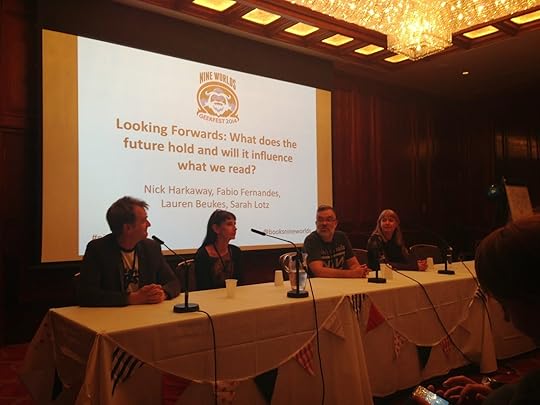
(looking forwards panel with Nick Harkaway, Sarah Lotz, Fabio Fernandez & Lauren Beukes)
Friday we spent mostly dipping into the "All the Books track" which had collected an impressive list of authors and topics. Oh and it also included me, on the "Writing the inhuman" panel (I'd like to thank my amazing panelists - Adrian Tchaikovsky, Laure Eve and Jen Williams) where we explored the meaning of inhumanity, who the true monsters are and writing the inhuman.
We also went to a panel on Time Travel (ably moderated by Paul Cornell) & Looking Forwards but I'm not going to list all the panels/events/cool stuff we went to as that'd take too long. It was lots and it was lots of fun.
I also read at the "New Voices: Class of 2014" my short story Roadkill - which can be heard on the BristolCon Podcast "Fringe in a flash" here: http://bristolcon.podbean.com/
There was cosply (not me, I don't do the dressing up thing) and lots of catching up with old con acquaintances and meeting new ones.
Oh yeah and we had dropped a bunch of books off with the All the Books bookshop, here's Adele doing a fine job (and you can see Airship Shape on the table)

And then on Saturday we got up and did it all over again, more fabulous panels, more chat, more fun. As a bonus we'd signed up for the Alchemist Dreams liqueur tasting which was great fun, not least because we got to taste the smell of musty books (better than it sounds).
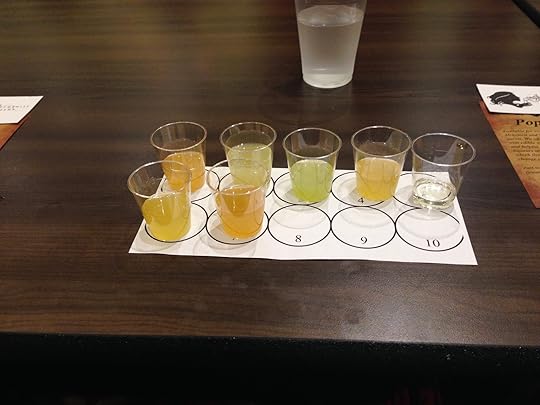
But perhaps after a late, and full of liquid refreshment evening, on Friday starting the day with a deep discussion on the philosophy of video games wasn't the best choice (fascinating as it was, too much thinking without enough tea).
Oh and we went to "Just a Moment" which was just as mad and entertaining as usual (well done Mr Cornell & all the panelists)

There were also cabarets and discos and music and more time in the bar, where I met a couple of new friends, and the Saturday crop of New Voices where Stark Holborn stole the show by having John Honor Jacobs read out the dialogue. Also worth watching is Pete Newman (the voice of the butler on Tea and Jeopardy).
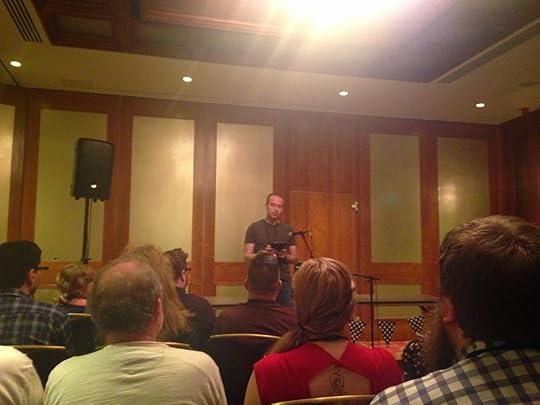
Sunday felt a little sleepy in comparison, but we were up earlier and at a 10 am panel (The neuroscience of swearing) and, after a massive lunch at the Pheasant pub (recommended for sensibly priced food & drink outside the con) we hung around for a bit, not settling in any one panel, slightly disappointed that the last panel for the All the Books track was cancelled, we grabbed our unsold books and headed home. Tired but enlivened, inspired and happy and ready to buy tickets for next year.
We went down Thursday night but missed most of the program items so spent our time in the very expensive bar - bottles of wine seemed the way to go and we sold shares in one of the bottles we bought. Yes it was that expensive. I'll not mention it again, except to say that our final bar bill was more expensive than one night's accommodation in the hotel. We spent some time at the nearby pub for food too ...
Anyhow. Panels, lots of them, and fun -

(looking forwards panel with Nick Harkaway, Sarah Lotz, Fabio Fernandez & Lauren Beukes)
Friday we spent mostly dipping into the "All the Books track" which had collected an impressive list of authors and topics. Oh and it also included me, on the "Writing the inhuman" panel (I'd like to thank my amazing panelists - Adrian Tchaikovsky, Laure Eve and Jen Williams) where we explored the meaning of inhumanity, who the true monsters are and writing the inhuman.
We also went to a panel on Time Travel (ably moderated by Paul Cornell) & Looking Forwards but I'm not going to list all the panels/events/cool stuff we went to as that'd take too long. It was lots and it was lots of fun.
I also read at the "New Voices: Class of 2014" my short story Roadkill - which can be heard on the BristolCon Podcast "Fringe in a flash" here: http://bristolcon.podbean.com/
There was cosply (not me, I don't do the dressing up thing) and lots of catching up with old con acquaintances and meeting new ones.
Oh yeah and we had dropped a bunch of books off with the All the Books bookshop, here's Adele doing a fine job (and you can see Airship Shape on the table)

And then on Saturday we got up and did it all over again, more fabulous panels, more chat, more fun. As a bonus we'd signed up for the Alchemist Dreams liqueur tasting which was great fun, not least because we got to taste the smell of musty books (better than it sounds).

But perhaps after a late, and full of liquid refreshment evening, on Friday starting the day with a deep discussion on the philosophy of video games wasn't the best choice (fascinating as it was, too much thinking without enough tea).
Oh and we went to "Just a Moment" which was just as mad and entertaining as usual (well done Mr Cornell & all the panelists)

There were also cabarets and discos and music and more time in the bar, where I met a couple of new friends, and the Saturday crop of New Voices where Stark Holborn stole the show by having John Honor Jacobs read out the dialogue. Also worth watching is Pete Newman (the voice of the butler on Tea and Jeopardy).

Sunday felt a little sleepy in comparison, but we were up earlier and at a 10 am panel (The neuroscience of swearing) and, after a massive lunch at the Pheasant pub (recommended for sensibly priced food & drink outside the con) we hung around for a bit, not settling in any one panel, slightly disappointed that the last panel for the All the Books track was cancelled, we grabbed our unsold books and headed home. Tired but enlivened, inspired and happy and ready to buy tickets for next year.
Published on August 12, 2014 03:25
August 7, 2014
Guest blog - A A Abbott
Today A A Abbott has dropped in to talk about business, books and writing

BIG BUSINESS, BAD INTERVIEWS AND THRILLS BESIDES
From an early age, I loved to tell stories. I was the eldest of five children born in five years, and even before I could read, I entertained my siblings with tales of witches, wizards, castles and caves. I liked stories with lots of action and dramatic tension, and my brothers and sister did too. Yet, as an adult, I chose a career with the certainty of a monthly income rather than try to make it as a freelance writer. Why? Simply, I was bored with being poor. Growing up in a large family, money was tight. I took Saturday jobs to afford records (remember those big black vinyl circles, anyone?), clothes and a social life. My parents fed, clothed and entertained us well, but on a shoestring budget: clothes were home-made or secondhand, and our day trips were always to destinations with no entrance charge. Luckily, with an aptitude for maths as well as English, a career as an accountant beckoned. Joining the profession gave me security, and more job interest than you might think; working for large multinational companies, I travelled the world on expenses.
Large corporations are full of busy people with a short attention span. The art of telling the story behind a set of financial figures lies in keeping it short and snappy. Subconsciously, I was learning the secrets of a successful suspense thriller: grab the reader’s interest quickly, use a logical structure and make every word matter.
I was the family breadwinner. Spending long hours earning a living, often travelling far from home, left no time for writing and too little, even, for family life. Luckily, my loved ones forgave me, and supported me in my decision to go freelance so I could write fiction as well. The result was Up In Smoke, my first thriller set in the world of big business, published in 2013. I then took a six month break from work to write After The Interview, which has just been published.

The lead characters in Up In Smoke are two women who work as industrial spies. Readers said they would prefer stronger male characters, so I gave them just that in After The Interview, writing about the struggle between two men who run large IT companies. Andrew Aycliffe’s impoverished background gives him tremendous drive and ambition, but his early career is almost derailed by a bad interview with Jed Gardner. While Andrew builds a successful business, he neither forgives nor forgets. With the help of a business coach friend who is not quite what she seems, Andrew finds himself in a position to take revenge – and he shows no mercy.
Jed is a complex character who cannot read people easily. Were he at school today, he would probably be diagnosed as high functioning autistic and given help in building relationships. Despite doing his best to make sense of a world he does not understand, Jed loses his job, reputation and more. He is not the only man to make mistakes. Boris Brooks, employed by Jed as a financier, succumbs to alcoholism, blackmail and murder.
Andrew, Jed and Boris are not real people. The awful interview that is central to the book, and the audacious fraud that follows it many years later, never happened. They easily could have done, though. My experience of big business has not just helped me write in a fast-paced, stripped-down style, it has given me inspiration.
I also write about places I know. Apart from a dramatic scene in Bath, the action in After The Interview (and, indeed, Up in Smoke) largely happens in Birmingham and London, both cities where I have lived and worked and which I visit often to see family and friends. Birmingham’s skyline decorates the cover of After The Interview, by Bristol artist Anna Hurl. Just as Bristol has decorated unlovely skyscrapers with amazing street art, Birmingham has added colour and glitz to its concrete heart. It is a friendly, buzzy city, and Andrew Aycliffe goes to great lengths to build a business there rather than succumb to the magnetic pull of London. The book contrasts the two cities just as it does Andrew and Jed.

Using short chapters to add pace, I aim for an exciting and easy read. I suspect readers who like Kate Atkinson, John Grisham and Barbara Vine will appreciate the readable style, surprises and insights into big business within After The Interviewand Up In Smoke. There are free samples of both books at http://aaabbott.co.uk.
I love talking to book clubs, business networks and social groups about my books, and, indeed, topics like capturing family memories or publishing an e-book as a business promotional tool. Having published my books myself with help from friends like Bristol writer Suzanna Stanbury, I am amazed at how easy and cost-effective it is. I do hope that anyone who would like a speaker for their group will contact me at aaabbottstories[at]gmail.com. I do not make a charge; I simply bring books along for readers to see, without any hard sell taking place.
My books are available on Amazon, and After The Interview can be ordered through bookstores as well. If you have ever had a bad interview, take a look at the book and see if you can predict what happens next!

BIG BUSINESS, BAD INTERVIEWS AND THRILLS BESIDES
From an early age, I loved to tell stories. I was the eldest of five children born in five years, and even before I could read, I entertained my siblings with tales of witches, wizards, castles and caves. I liked stories with lots of action and dramatic tension, and my brothers and sister did too. Yet, as an adult, I chose a career with the certainty of a monthly income rather than try to make it as a freelance writer. Why? Simply, I was bored with being poor. Growing up in a large family, money was tight. I took Saturday jobs to afford records (remember those big black vinyl circles, anyone?), clothes and a social life. My parents fed, clothed and entertained us well, but on a shoestring budget: clothes were home-made or secondhand, and our day trips were always to destinations with no entrance charge. Luckily, with an aptitude for maths as well as English, a career as an accountant beckoned. Joining the profession gave me security, and more job interest than you might think; working for large multinational companies, I travelled the world on expenses.
Large corporations are full of busy people with a short attention span. The art of telling the story behind a set of financial figures lies in keeping it short and snappy. Subconsciously, I was learning the secrets of a successful suspense thriller: grab the reader’s interest quickly, use a logical structure and make every word matter.
I was the family breadwinner. Spending long hours earning a living, often travelling far from home, left no time for writing and too little, even, for family life. Luckily, my loved ones forgave me, and supported me in my decision to go freelance so I could write fiction as well. The result was Up In Smoke, my first thriller set in the world of big business, published in 2013. I then took a six month break from work to write After The Interview, which has just been published.

The lead characters in Up In Smoke are two women who work as industrial spies. Readers said they would prefer stronger male characters, so I gave them just that in After The Interview, writing about the struggle between two men who run large IT companies. Andrew Aycliffe’s impoverished background gives him tremendous drive and ambition, but his early career is almost derailed by a bad interview with Jed Gardner. While Andrew builds a successful business, he neither forgives nor forgets. With the help of a business coach friend who is not quite what she seems, Andrew finds himself in a position to take revenge – and he shows no mercy.
Jed is a complex character who cannot read people easily. Were he at school today, he would probably be diagnosed as high functioning autistic and given help in building relationships. Despite doing his best to make sense of a world he does not understand, Jed loses his job, reputation and more. He is not the only man to make mistakes. Boris Brooks, employed by Jed as a financier, succumbs to alcoholism, blackmail and murder.
Andrew, Jed and Boris are not real people. The awful interview that is central to the book, and the audacious fraud that follows it many years later, never happened. They easily could have done, though. My experience of big business has not just helped me write in a fast-paced, stripped-down style, it has given me inspiration.
I also write about places I know. Apart from a dramatic scene in Bath, the action in After The Interview (and, indeed, Up in Smoke) largely happens in Birmingham and London, both cities where I have lived and worked and which I visit often to see family and friends. Birmingham’s skyline decorates the cover of After The Interview, by Bristol artist Anna Hurl. Just as Bristol has decorated unlovely skyscrapers with amazing street art, Birmingham has added colour and glitz to its concrete heart. It is a friendly, buzzy city, and Andrew Aycliffe goes to great lengths to build a business there rather than succumb to the magnetic pull of London. The book contrasts the two cities just as it does Andrew and Jed.

Using short chapters to add pace, I aim for an exciting and easy read. I suspect readers who like Kate Atkinson, John Grisham and Barbara Vine will appreciate the readable style, surprises and insights into big business within After The Interviewand Up In Smoke. There are free samples of both books at http://aaabbott.co.uk.
I love talking to book clubs, business networks and social groups about my books, and, indeed, topics like capturing family memories or publishing an e-book as a business promotional tool. Having published my books myself with help from friends like Bristol writer Suzanna Stanbury, I am amazed at how easy and cost-effective it is. I do hope that anyone who would like a speaker for their group will contact me at aaabbottstories[at]gmail.com. I do not make a charge; I simply bring books along for readers to see, without any hard sell taking place.
My books are available on Amazon, and After The Interview can be ordered through bookstores as well. If you have ever had a bad interview, take a look at the book and see if you can predict what happens next!
Published on August 07, 2014 07:38
August 5, 2014
Solaris Rising 3 - interview with the editor Ian Whates & a review
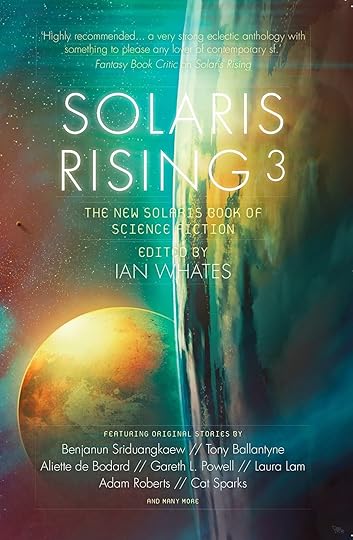
I managed to catch up with Ian Whates, the editor of this fine anthology and asked him a few questions -

For anyone who hasn't come across a Solaris Rising book before can you describe what they're all about?
Good question. Let’s see if I can formulate a halfway decent answer. I’ve compiled many anthologies over the past nine years, mostly via my own NewCon Press with a few The Mammoth Book of… titles thrown in for good measure. However, these have all been themed. With the Solaris Rising series I wanted to take a different approach. I saw this as an opportunity to demonstrate the strength and breadth of science fiction, to highlight the sheer variety that the genre contains. The intention is to provide established SF fans with entertainment value via a veritable smörgasbord of high quality stories but also, hopefully, to showcase what modern SF has to offer for new readers or those who have lost faith with the genre. Science fiction continues to be a vibrant, inventive, and relevant form of literature. If somebody comes away from reading one (or even all) of the SR volumes having discovered a new author or two whose novels and work they want to explore further… Job done.
I guess the obvious question is - how do you choose the stories/contributors?
I start by drawing up a shortlist of authors I’d like to include in the book, then set about approaching them, giving as much notice as possible and hoping their many other commitments enable them to submit within the time frame. Of course, there are always those who can’t, those who agree to but then find that life sneaks up on them, and those who submit stories that aren’t quite what I’m looking for. SR3 features at least two (Ian R MacLeod and Ken Liu) that I’ve been badgering for submissions since the very first book, while there are still a number (Gwyneth Jones, Elizabeth Bear, etc) whom I’ve yet to persuade. I primarily approach established names, conscious that the line-up has to contain enough well-known authors to attract readers, but I invariable sneak in one or two lesser known writers as well, those whose work I’m confident can sit comfortably in such company.
As the stories come in and are either accepted, set aside for further consideration, or rejected, I begin to build a picture in my mind, not so much of subject matter as the tone and feel of the accepted pieces, and going forward this helps decide what I continue to take. Sometimes I read a story and think, “Yes, that’s the perfect opener,” or, “That provides the final word I’ve been looking for.” Generally, though, I leave the ordering of the ToC until after all the stories are in.
As well as this excellent collection what's coming up next? What are you currently working on?
Funny you should ask… On the writing front, I have a number of new short stories set to appear in the next few months, including pieces in Galaxy’s Edge, Stupefying Stories, Daily Science Fiction and PostScripts, as well as in several anthologies.
On the editing/publishing front, I’m about to publish several new titles via NewCon Press at the London Worldcon, with a launch party on the Friday afternoon. These include The Race, debut novel from Nina Allan, who is a wonderful writer. She won a BSFA Award earlier this year and also France’s Grand Prix de l’Imaginaire. Then there’s Marcher, a novel by another wonderful writer Chris Beckett, who won the Edge Hill Prize a few years back (from a shortlist that included a Booker Prize winner and two Booker shortlisted authors) and the Arthur C Clarke Award last year. This novel was originally released as a paperback in the USA in 2009 but Chris was never satisfied with it, so he’s taken the opportunity to completely rewrite the text, even changing the perspective from first to third person and giving us a different ending. I’m also releasing Sibilant Fricative, a book of critical essays and reviews of literary and cinematic SF by Adam Roberts, whose pithy putdowns have to be seen to be believed. And then, of course, there is Paradox…
This features all new stories inspired by the Fermi Paradox, and I’ve managed to prise stories from some fabulous authors (Mike Resnick, Pat Cadigan, Paul Cornell, Paul di Filippo, Robert Reed, Adam Roberts, Eric Brown, Keith Brooke, Tricia Sullivan, George Zebrowski, Mercurio D Rivera, Stephanie Saulter, Adrian Tchaikovsky, etc) as well as a number of scientists. The book features a fascinating introduction by astronomer Marek Kukula and his colleague at the Royal Observatory in Greenwich, Rob Edwards, while the hardback finishes with an essay by Stephen Baxter. I’m really excited by this one, in fact by all the new releases.
You say the best opening line in the book is by Laura Lam (“I thought I would write and tell you what happened after you died.”) - How important are opening lines in your opinion?
A good opening line is a tremendous asset for a story. It helps hook the reader (or the editor receiving the submission), which means they immediately have something invested in what follows. Of course, if what follows fails to live up to that initial promise, then the best opening line in the world will go to waste. However, it’s very easy for a writer to underestimate the importance of that opening line. Always worth a little bit of extra care with that one, as it sets the tone.
You've worked with lots of names in the field, is there someone you'd really like to work with but you've not had the chance to yet & if so why them?
Good Lord, yes. Loads of them. The day there isn’t is the day I’ll pack up being an editor. My two biggest thrills in editing are: 1) when I get the chance to work with an author whose writing I love, whose books and stories I’ve devoured as a child/teen/adult, and 2) being able to publish the work of a really exciting new or lesser known author whose writing excites me as much as any of the big names. Sorry, I haven’t been specific here because there really are so many authors I have ambitions to work with, and if I provided a list of names I’d only look at this an hour or so later and think, “How could I possibly miss him/her out?” As for why… Because in every instance I love their writing. Simple as that.
You say that you'd like to showcase SF "without placing any restraints on the authors’ imagination by imposing a theme", why is that principle important for Solaris Rising? Can you envisage future themes?
Not with the Solaris Rising series no, not unless the publisher was to decide on a change of tack and asked me to – at the end of the day, this is their series. I’m simply the custodian who has the privilege of marshalling the books on Solaris’ behalf. As explained in my opening response, the whole intent of SR is to showcase variety and quality; that’s been my mission statement since I embarked on the project and, in a sense, provides a very loose set of parameters in itself.
What is your criteria for defining a short as Science Fiction, as opposed to any other genre?
Hah! The old hoary dilemma: put any twenty science fiction fans or writers in a room and ask them to define ‘science fiction’ and you’ll end up with twenty different answers… I suppose it comes down to my own internal compass. I know what I consider to be science fiction and what not. Whether I could ever express that in a concise and consistent manner is a different question. Over the years there have been submissions, including some from big-name authors, which I’ve rejected for various SR volumes because they simply weren’t SF (in my opinion). At the same time, each volume has included stories, particularly those that veer towards the weirder side, which others might have disqualified were they in my shoes. For example, Jayne Fenn’s “Dreaming Towers, Silent Mansions” and Tricia Sulivan’s “The One that Got Away”, both from volume 1, and Mike Allen’s “Still Life with Skull” from volume 2. Even Nina Allan’s “The Science of Chance” in volume 3 may have its sceptics, since this is a police procedural in an alternative reality Russia, but I’ve always considered that a branch of SF.
I suppose, at the end of the day, a story’s tone and the language used, its structure and ambition, play as much a part as its content.
Actually the series has included one story that definitely isn’t SF, although it is about the genre: Peter F Hamilton’s “Return of the Mutant Worms” from volume 1.
Do you think there is an ideal length for a short story?
No. There are some great flash pieces and some fabulous novellas, stopping off at just about every point in between. One of my own pieces that I’m particularly satisfied with, “Digital Democracy” (which was commissioned by Ken MacLeod), consists of just four lines and comes in at 42 words. I’m a great believer in a story being as long or as short as the narrative demands.
What, for you, are the elements that go to make a perfect short story?
I don’t think it’s possible to specify them in any definitive way. One of the joys of the short story, in fact of any length of story, is its variety. By all means I can highlight important factors but to suggest they’re vital or indispensable would be an oversimplification, because I could then point out fantastically crafted stories that lack one or more of those elements. Action pieces, mood pieces, clever stories with a twist, innovative tales that explore new concepts, mysteries, chilling stories, humorous stories, etc, they all have different requirements, different emphases.
A story has to engage the reader first and foremost. Whether that be by piquing their curiosity or setting their heart racing from the off, or enchanting them or amusing them. A convincing setting and engaging characters can often be key, but in the more confined limitations of the shorter form this often has to be accomplished with a few deft sentences, relying on the reader to fill in the rest as the narrative develops. A story has to have a strong opening, whether that’s a languid scene that builds as we go, or a piece that throws you straight into the action, it has to have a purpose rather than simply stumbling into the narrative, and the ending is, of course, important. Even an open ending is still an ending.
From a writer’s perspective, the important thing is to determine at outset what you want to achieve, what the story is intended to convey, and then deliver that to the best of your ability.
Dave Gullen popped into Bristol Book Blog a short while ago (http://brsbkblog.blogspot.co.uk/2014/07/mind-seed-7-tips-for-new-publisher.html#more) to talk about the first anthology he edited - and one of the points he made was that "story order is important", do you agree? How do you set about arranging the stories in the Solaris Rising books?
As mentioned earlier, I generally decide on the opening and closing stories during the reading and editing process. These will invariably be stories I consider to be particularly strong, although not necessarily the one I deem the strongest. Sometimes you receive a truly outstanding piece that, for reasons of pacing or content, simply doesn’t work at either end of the book. I often have these lurking in second or third spot to pounce and catch the reader unawares.
After I’ve chosen the stories at either end, it’s then a case of working forward and backward from those two anchor points. I always position a story so that there’s a link, however tenuous, to those on either side. The link may be thematic, it may be conceptual or something I consider common in character or setting, it may even be a contrast in pacing: a mood piece followed by an action one, to vary the tempo. When I’ve finalised the ToC (and there’s often a good deal of toing and froing before that happens) I’m able to see a chain of links that runs throughout the book. I might be the only one that sees that, but it’s there.
In one sentence what is your best piece of advice for new writers?Be thick skinned, don’t take rejection personally; oh, and join a writers’ group; having your work reviewed and critiqued by contemporaries and, as importantly, the exercise of critiquing their work, can teach you a hell of a lot. Okay, that’s two pieces of advice. This isn’t a maths exam, is it?
Many Thanks to Ian for taking the time to answer the questions, the Bristol Book Blog review is below
Ian Whates says in his introduction that he has attempted to showcase the rich variety that modern science fiction has to offer. I would tend to agree as this is a fine collection of stories. Of course, as with any anthology, there are taste variations between the editor and the reader but the vast majority of these stories really hit the spot. The one or two off ones are not poorly written, just didn’t do it for me. It’s pointless to try and summarise all the stories so I’ll just mention the ones that really stood out for me. I was very taken by Ken Liu’s Homo Floresiensis which has stayed with me since reading it, a tale of the discovery of living specimens of what the world nicknamed hobbits a few years ago, The Howl by Ian MacLeod and Martin Sketchley and The science of chance by Nina Allen both explored the same sort of territory (timelines) and really captured the imagination. They swim through sunset seas by Laura Lam was a very striking tale with a brilliant first line Dear Eli, I thought I would write and tell you what happened after you died and I also enjoyed psychological Thing and sick by Adam Roberts. Also worth a mention are Gareth L Powell’s entertaining Red lights, and rain</i> and the clever Popular images from the first manned mission to Enceladus by Alex Dally MacFarlane.
There, I said it was pointless to try and summarise all the stories and I then tried to do it! I'd best stop before I do them all. It's hard to pick favourites here, which I think is as good a sign as any that you should pick up this collection if you're an SF fan.
Overall - This is an eclectic and entertaining collection, often thought-provoking, like all best SF. Recommended.
Published on August 05, 2014 12:33
and now for some reviews
Stein: On writing by Sol Stein
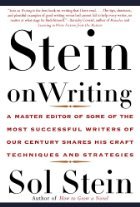
I’ve now read enough writing books to know that most aspects of good writing can be taught, although some of it comes natural to some writers. It is both an art and a craft and good writing books teach you the craft. Sol Stein’s is a good writing book, as you’d expect from a famous editor. He has probably the best explanation of “show don’t tell” that I’ve read. he is a bit sniffy about "commercial" fiction though ...
Overall - If you’d like to learn what makes good writing good then read this book.
Steering the craft by Ursula Le Guin
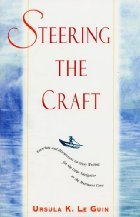
I find I don’t have much to say about this book, which I read some time ago and have not got round to reviewing. Whilst it is a good introduction, with examples and exercises, of how to write I didn’t find that it spoke to me.
Overall - Worth a read for aspiring writers but no earth shattering insights
The writers and artists guide to How to Write by Harry Bingham
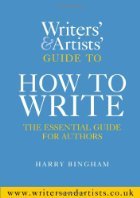
This is a fine writing guide with lots of modern examples, a comprehensive guide to writing (but not editing) that is easy to read and follow.
Overall – useful guide, but not one for dipping into
Weirdmonger by D F Lewis
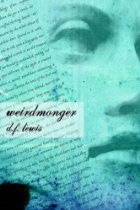
Why?
You want a longer review? Well this is a collection of writing from D F Lewis. Writing, words on the page, no more no less and certainly not stories. So my question is, why? Why produce a thick book of writing that has no trace of story? Maybe I’m missing something?
Overall – No really, why?
Station eleven by Emily St. John Mandel
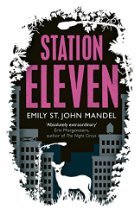
In the here and now Georgian flu explodes across the world with a mortality rate of 99%. Twenty years after the collapse of civilisation the travelling symphony moves through northern America performing concerts and Shakespeare plays because, as is written on one of their caravans ‘survival is insufficient’. The book cleverly weaves the stories of its main protagonists together throughout time skipping forwards and backwards to the days before and after the flu, adding layers of detail and revealing new depth as it goes.
We get to see the interconnectedness of the world through the relationships surrounding Arthur, an aging film star, in the lives he touches. There is Kirsten, a child actress who becomes a key member of the symphony and who carries a comic called Station Eleven written by Arthur’s first wife. Jeevan, a former paparazzi turned paramedic who is at a production of King Lear that Arthur and Kirsten are appearing in. Clark, Arthur’s friend who, after the flu, builds the museum of civilisation. The flu is a device, a background one that is not gone into in much detail, this isn’t [The Stand] and Mandel spends little time dwelling on how the flu spreads or how civilisation collapses. We do see some of the collapse through the eyes of Jeevan but he mostly just watches out of a window. But this isn’t what the book is about, it doesn’t concern itself with distasteful survival, it concerns itself with how to live and with beauty. Survival is insufficient.
There is a message that many people are just sleepwalking through their lives, highlighted most obviously in Clark’s pre-flu story with his unfulfilling life, or Jeevan’s story about having no justification to be a paparazzi, and later an entertainment journalist, or even Arthur whose own story explores the shackles that success and fame can bind you with. There are themes that come forth in the art and story of the comic which gives the book its title and King Lear is obviously of importance too and there are echoes, reflections, resonances with the comic and the play to be found within. It is an accomplished, often spellbinding and affecting book that took a while to get a grip on me, but once it did I breezed through the second half in no time at all.
Overall - This is ultimately a book about relationships on a very human scale and what makes life worth living. Impressive and recommended.

I’ve now read enough writing books to know that most aspects of good writing can be taught, although some of it comes natural to some writers. It is both an art and a craft and good writing books teach you the craft. Sol Stein’s is a good writing book, as you’d expect from a famous editor. He has probably the best explanation of “show don’t tell” that I’ve read. he is a bit sniffy about "commercial" fiction though ...
Overall - If you’d like to learn what makes good writing good then read this book.
Steering the craft by Ursula Le Guin

I find I don’t have much to say about this book, which I read some time ago and have not got round to reviewing. Whilst it is a good introduction, with examples and exercises, of how to write I didn’t find that it spoke to me.
Overall - Worth a read for aspiring writers but no earth shattering insights
The writers and artists guide to How to Write by Harry Bingham

This is a fine writing guide with lots of modern examples, a comprehensive guide to writing (but not editing) that is easy to read and follow.
Overall – useful guide, but not one for dipping into
Weirdmonger by D F Lewis

Why?
You want a longer review? Well this is a collection of writing from D F Lewis. Writing, words on the page, no more no less and certainly not stories. So my question is, why? Why produce a thick book of writing that has no trace of story? Maybe I’m missing something?
Overall – No really, why?
Station eleven by Emily St. John Mandel

In the here and now Georgian flu explodes across the world with a mortality rate of 99%. Twenty years after the collapse of civilisation the travelling symphony moves through northern America performing concerts and Shakespeare plays because, as is written on one of their caravans ‘survival is insufficient’. The book cleverly weaves the stories of its main protagonists together throughout time skipping forwards and backwards to the days before and after the flu, adding layers of detail and revealing new depth as it goes.
We get to see the interconnectedness of the world through the relationships surrounding Arthur, an aging film star, in the lives he touches. There is Kirsten, a child actress who becomes a key member of the symphony and who carries a comic called Station Eleven written by Arthur’s first wife. Jeevan, a former paparazzi turned paramedic who is at a production of King Lear that Arthur and Kirsten are appearing in. Clark, Arthur’s friend who, after the flu, builds the museum of civilisation. The flu is a device, a background one that is not gone into in much detail, this isn’t [The Stand] and Mandel spends little time dwelling on how the flu spreads or how civilisation collapses. We do see some of the collapse through the eyes of Jeevan but he mostly just watches out of a window. But this isn’t what the book is about, it doesn’t concern itself with distasteful survival, it concerns itself with how to live and with beauty. Survival is insufficient.
There is a message that many people are just sleepwalking through their lives, highlighted most obviously in Clark’s pre-flu story with his unfulfilling life, or Jeevan’s story about having no justification to be a paparazzi, and later an entertainment journalist, or even Arthur whose own story explores the shackles that success and fame can bind you with. There are themes that come forth in the art and story of the comic which gives the book its title and King Lear is obviously of importance too and there are echoes, reflections, resonances with the comic and the play to be found within. It is an accomplished, often spellbinding and affecting book that took a while to get a grip on me, but once it did I breezed through the second half in no time at all.
Overall - This is ultimately a book about relationships on a very human scale and what makes life worth living. Impressive and recommended.
Published on August 05, 2014 06:51
August 4, 2014
Another book giveaway
Today I have 3 copies of "Anger - How to control it so it won't control you" to give away. To win a copy just email BRSBKBLOG at gmail dot com with your name and winners will be drawn at random in 2 weeks time.
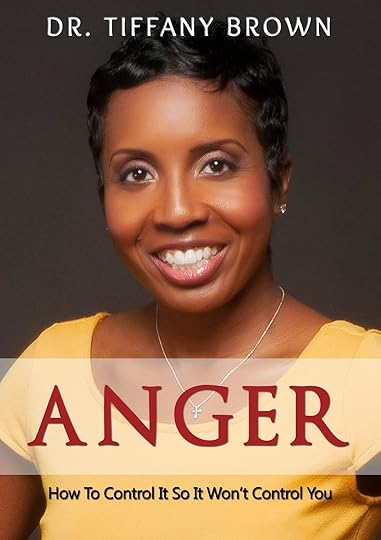

Published on August 04, 2014 02:40
Pete Sutton's Blog
- Pete Sutton's profile
- 14 followers
Pete Sutton isn't a Goodreads Author
(yet),
but they
do have a blog,
so here are some recent posts imported from
their feed.



